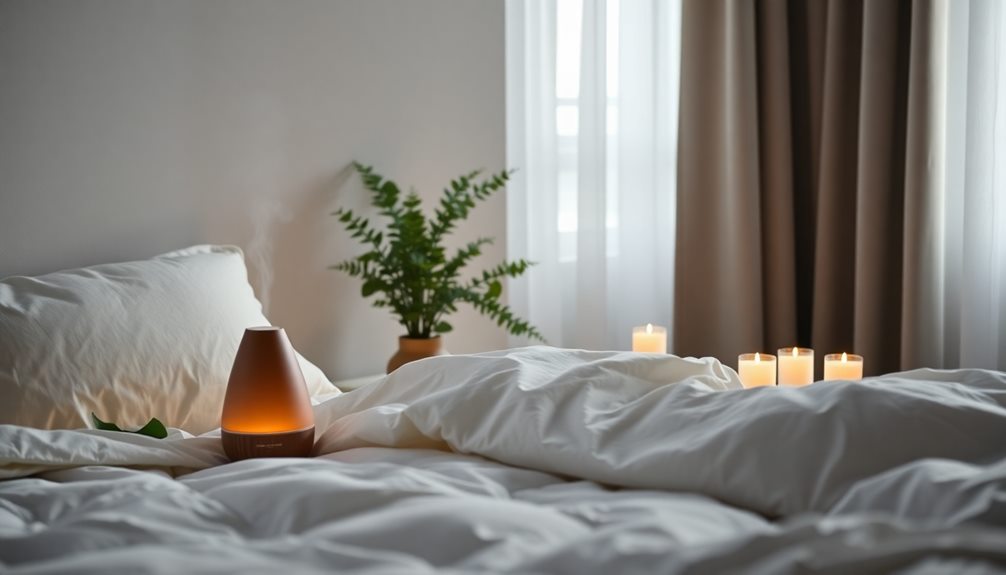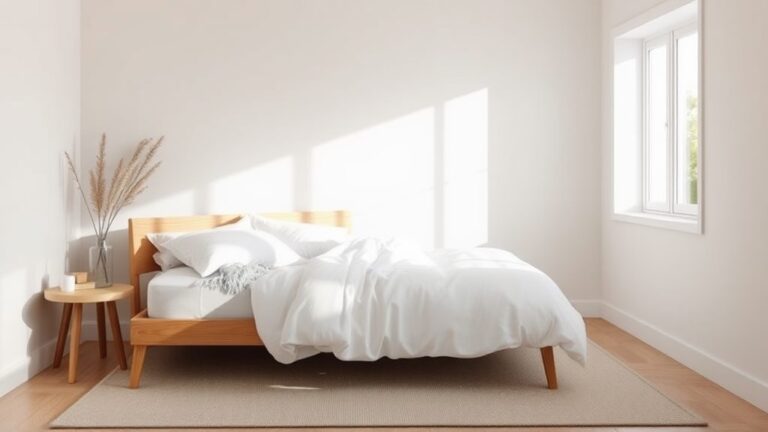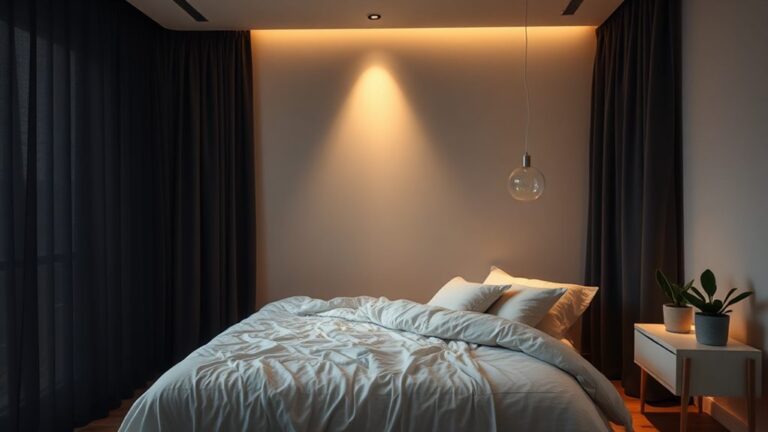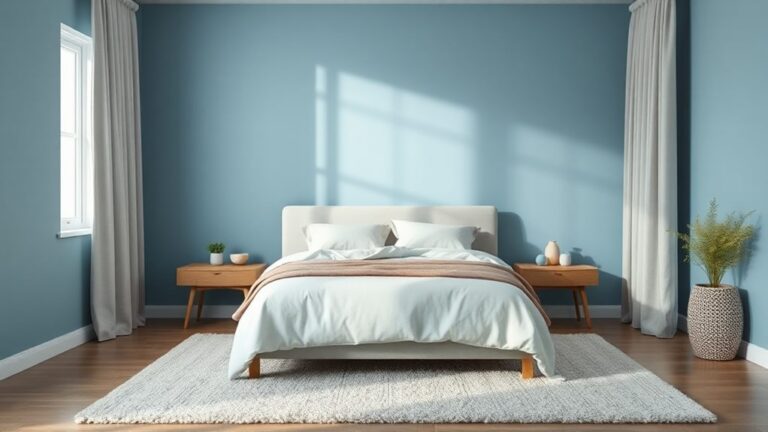You can create a restful bedroom sanctuary by incorporating natural sleep aids into your decor. Start by using calming colors like soft blues, pale greens, or neutral tones to promote relaxation. Soothe your senses with nature sounds, essential oils like lavender or chamomile, and dimmable lighting options. Add some sleep-promoting plants like lavender or jasmine, and surround yourself with comforting textures like soft bedding and velvety rugs. Finish the space with relaxing artwork choices and a minimalist design. By incorporating these elements, you'll be well on your way to creating a peaceful retreat that fosters better sleep, and the best part is, there's even more to explore.
Nightcap Notes
- Soft blues, pale greens, and neutral colors create a soothing atmosphere for better sleep.
- Incorporate calming nature sounds like rainfall, ocean waves, or birdsong to promote relaxation.
- Essential oils like lavender, chamomile, and valerian root oil can promote sleep and relaxation.
- Dimmable lighting options and a cooling temperature control can signal the body that it's time to sleep.
- Comforting textures like soft bedding and cozy throws can create a cozy and inviting space for restful sleep.
Calming Colors for Bedrooms
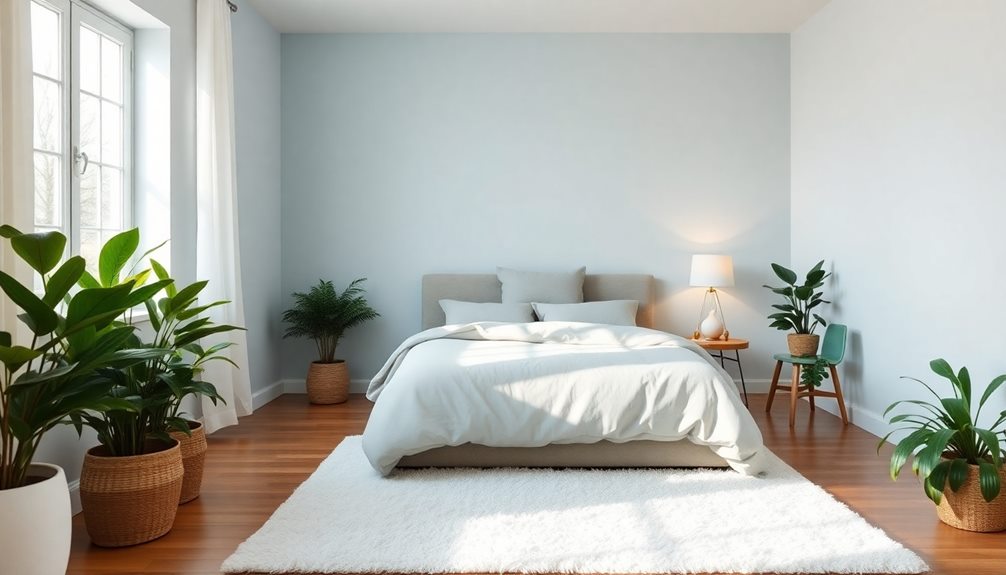
Surrounded by calming colors, you can unwind and relax in your bedroom, setting the stage for a restful night's sleep. Colors can greatly impact your mood and emotions, and in a bedroom, choosing colors that promote relaxation is crucial.
Soft blues and pale greens are popular choices for bedrooms, as they create a soothing atmosphere that helps you calm down after a long day.
Neutral colors like beige, cream, and gray are also effective in creating a calming environment. These colors are gentle on the eyes and don't stimulate your brain, making it easier to fall asleep.
When choosing a color for your bedroom walls, consider the natural light in your room and the color of your furniture and bedding. Avoid bold and bright colors, as they can be overstimulating and interfere with your sleep.
Soothing Nature Sounds
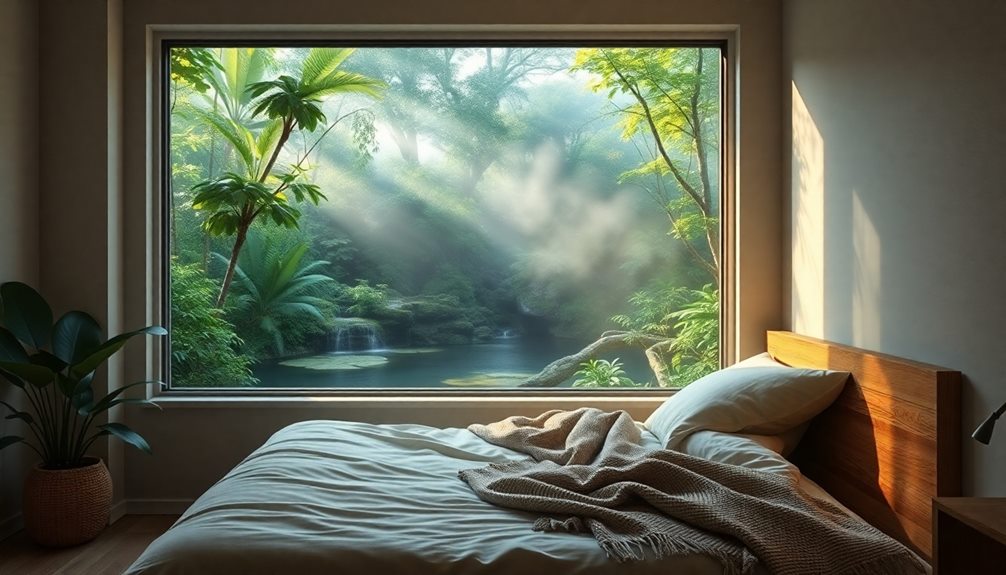
Frequently, people find that soothing nature sounds help them unwind and prepare for a restful night's sleep.
These calming sounds can be especially helpful in a bedroom setting, where you want to create a peaceful atmosphere that promotes relaxation. You can incorporate soothing nature sounds into your bedroom decor through various means, such as a sound machine or a mobile app.
Here are three soothing nature sounds you can use to improve your sleep:
- Rainfall sounds: The sound of gentle rainfall can be very calming and is often used to help people fall asleep. You can find rainfall sound recordings online or through mobile apps.
- Ocean waves: The sound of ocean waves can be very soothing and can help you relax and unwind. You can find ocean wave sound recordings online or through mobile apps.
- Birdsong: The sound of birds singing can be very calming and can help you wake up feeling refreshed. You can find birdsong sound recordings online or through mobile apps.
Essential Oils for Sleep
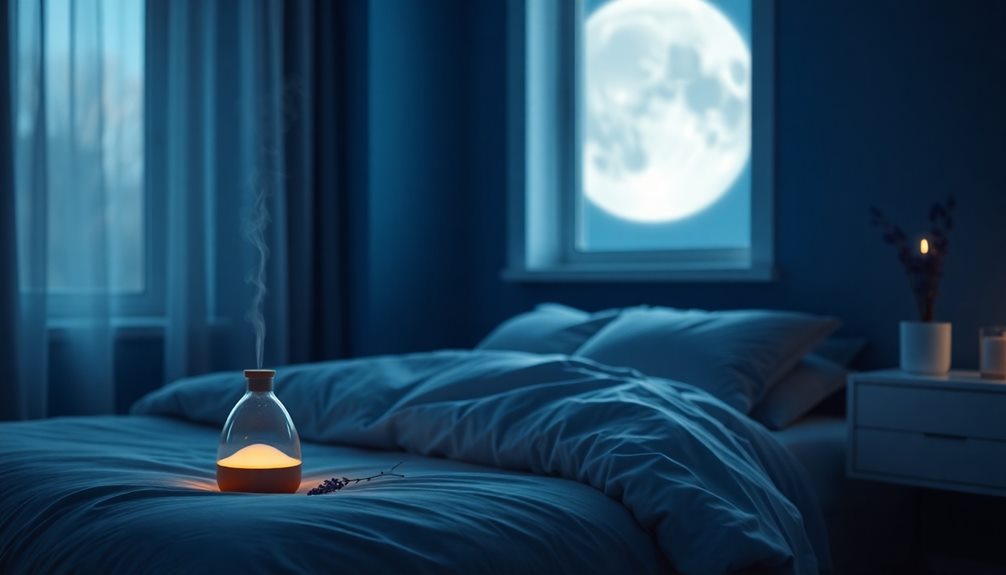
Tranquility is a crucial element in setting the stage for a good night's sleep. To create this peaceful atmosphere, you're turning to essential oils, which have been used for centuries to promote relaxation and calmness.
When it comes to sleep, certain essential oils stand out for their sedative properties. Lavender oil is a popular choice, known for its soothing effects on the mind and body. You can add a few drops to your pillowcase or use a diffuser to fill your bedroom with its calming scent.
Other essential oils that can help you sleep better include chamomile, valerian root, and bergamot. Chamomile oil has a gentle, soothing effect, while valerian root oil has a stronger, more sedative effect. Bergamot oil, on the other hand, has a calming effect that can help reduce anxiety.
To use these oils effectively, mix a few drops with a carrier oil and massage it onto your skin or add it to your bathwater. You can also use a diffuser to fill your bedroom with the oil's scent, promoting a restful night's sleep.
Dimmable Lighting Options
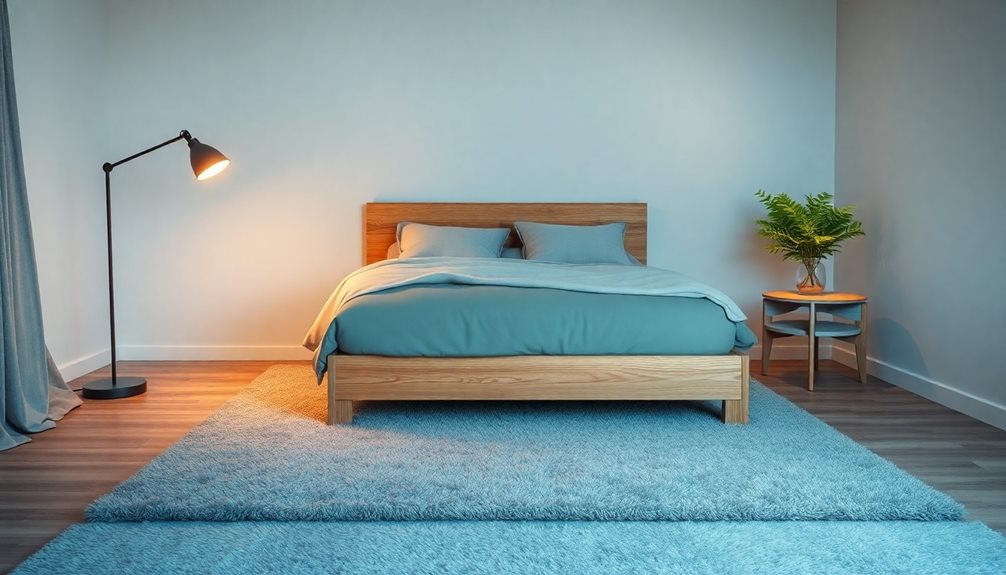
While setting the right mood with essential oils is key to a restful night's sleep, it's equally important to control the lighting in your bedroom.
Dimmable lighting options can help you achieve the perfect ambiance for a good night's sleep. You can adjust the light levels to suit your needs, creating a relaxing atmosphere that signals your body that it's time to sleep.
To create a sleep-conducive environment, consider the following dimmable lighting options:
- Smart Light Bulbs: These bulbs can be controlled remotely using a smartphone app, allowing you to adjust the brightness and color temperature to your liking.
- Table Lamps with Dimmer Switches: These lamps provide a warm and cozy glow, and the dimmer switch allows you to adjust the light level to your preference.
- Floor Lamps with Adjustable Arms: These lamps are versatile and can be adjusted to direct the light where you need it, creating a relaxing ambiance in your bedroom.
Sleep-Promoting Plants
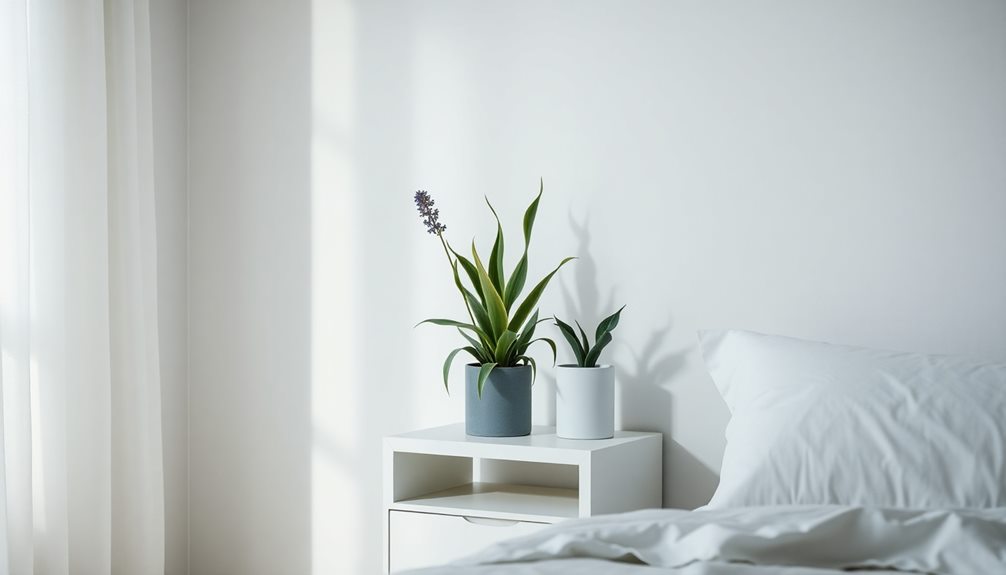
Your bedroom sanctuary isn't complete without the addition of sleep-promoting plants. These plants can greatly improve the air quality and ambiance in your bedroom, making it easier for you to fall asleep and stay asleep.
You can start by incorporating plants like lavender, which is known for its calming effects and soothing scent. Lavender can help reduce anxiety and stress, creating a relaxing atmosphere that promotes better sleep.
Other sleep-promoting plants you can consider include jasmine, valerian, and chamomile.
These plants have a calming effect on the mind and body, helping you unwind after a long day. Jasmine, in particular, has a sweet fragrance that can help reduce stress and anxiety. Valerian is known for its sedative properties, while chamomile has anti-inflammatory properties that can help soothe your mind and body.
Cooling Temperature Control
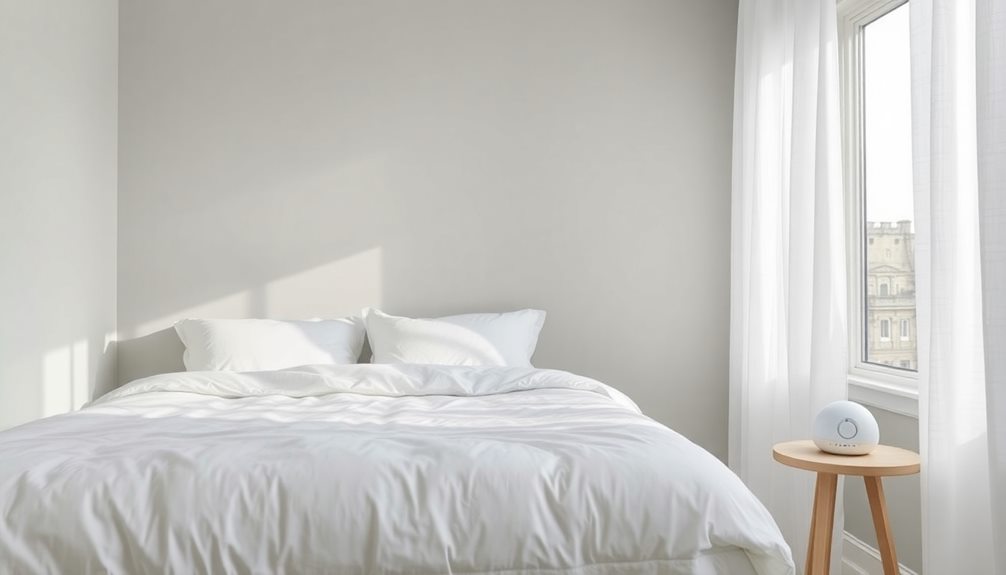
By creating a sleep-conducive environment with sleep-promoting plants, you've taken the first step in improving your sleep quality.
However, a suitable temperature is also vital for a restful night's sleep. A room that's too hot or too cold can disrupt your sleep patterns and make you feel groggy in the morning.
Cooling temperature control is essential for maintaining a comfortable sleep environment.
- Use light bedding: Switch to light, breathable bedding, such as cotton or bamboo sheets, to keep you cool during the summer months.
- Invest in a smart thermostat: A smart thermostat allows you to regulate the temperature in your bedroom remotely, ensuring it's always at a comfortable level.
- Utilize natural ventilation: Open your windows at night to let in a cool breeze, which can help lower the temperature in your bedroom.
Relaxing Artwork Choices
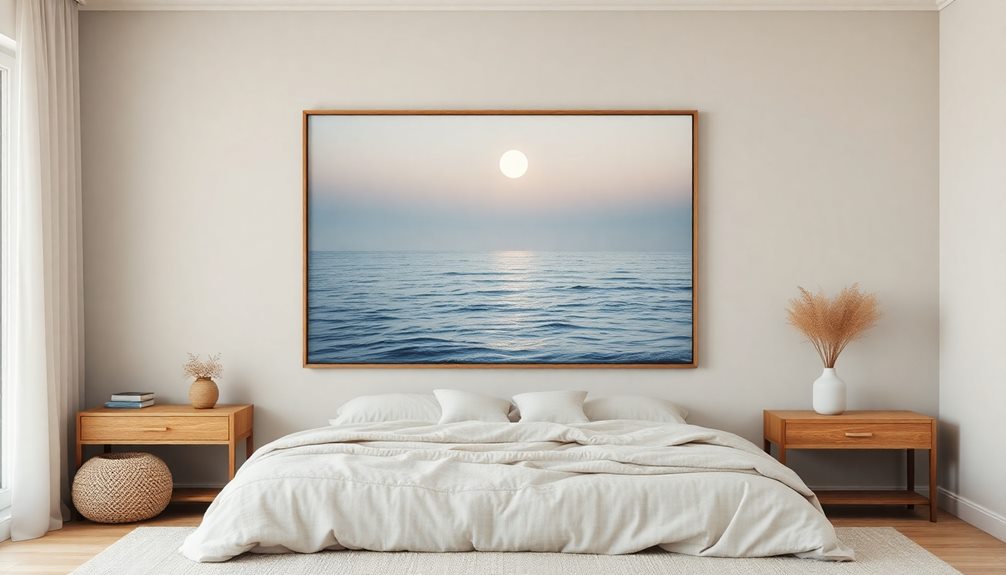
Something as simple as the artwork in your bedroom can substantially impact your sleep quality.
The right artwork can create a calming atmosphere, helping you unwind before bed. When choosing relaxing artwork for your bedroom, opt for pieces that promote serenity and peacefulness.
Consider nature-inspired artwork, such as landscapes or botanical prints, which can evoke feelings of calmness and tranquility.
Avoid artwork with bold colors or busy patterns, as they can stimulate your mind and interfere with your sleep.
Instead, choose artwork with soft, muted colors that promote relaxation. Black and white photographs or gentle watercolor paintings can be great options.
You can also consider artwork that incorporates calming imagery, such as gentle waves or soothing skies.
Comforting Textures Matter
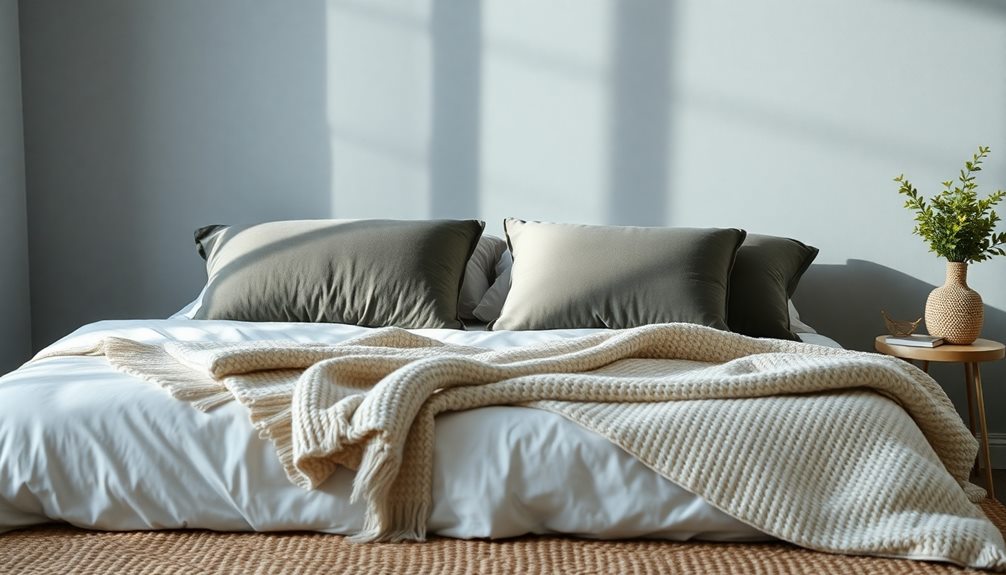
Alongside a soothing atmosphere, the textures in your bedroom can greatly impact your sleep quality.
You want to surround yourself with comforting textures that promote relaxation and help you unwind after a long day.
The right textures can create a cozy and inviting space that makes you feel calm and serene.
To create a sleep-conducive environment, consider incorporating the following textures into your bedroom:
- Soft Bedding: Invest in a plush duvet cover, soft sheets, and a comfortable mattress topper. These will provide you with a cozy surface to snuggle up in and promote a restful night's sleep.
- Velvety Rugs: Add a velvety area rug to your bedroom floor to create a soft and calming surface underfoot. This will also help to muffle any noise and create a peaceful atmosphere.
- Cozy Throws: Keep a few cozy throws on hand to add an extra layer of warmth and texture to your bed. Look for throws made from soft, natural fibers like wool or cotton.
Aromatherapy Diffuser Benefits
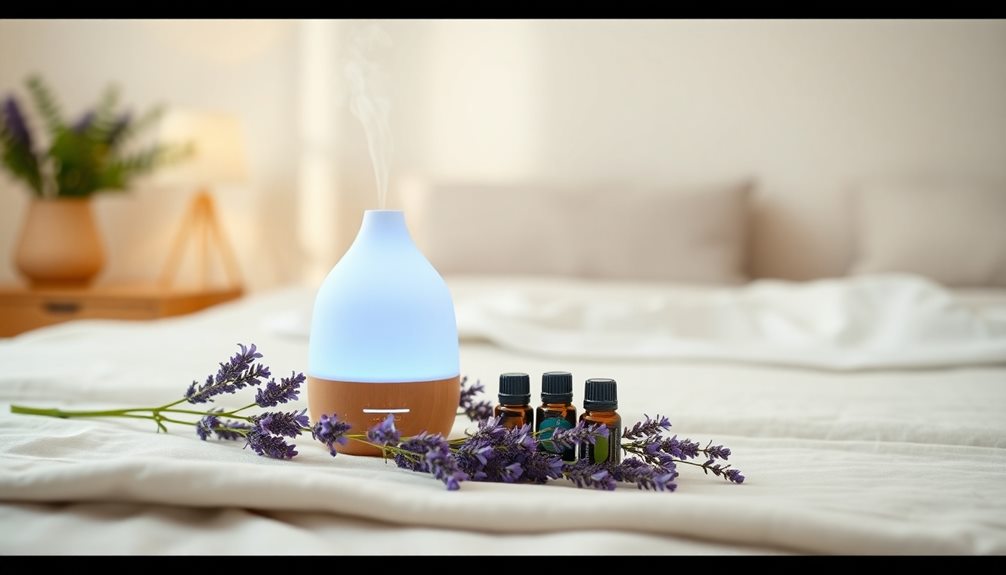
Your bedroom can be a haven for relaxation, and a key component of creating this haven is the scents that fill the air. An aromatherapy diffuser can help you achieve this by releasing a gentle mist of your favorite essential oils into the air. By using an aromatherapy diffuser, you can create a calming atmosphere that promotes relaxation and helps you unwind after a long day.
| Essential Oil | Mood-Boosting Benefits | Sleep-Promoting Effects |
|---|---|---|
| Lavender | Reduces stress and anxiety | Promotes a restful night's sleep |
| Chamomile | Soothes and calms the mind | Helps you fall asleep faster |
| Bergamot | Uplifts and relaxes the body | Improves the quality of your sleep |
Using an aromatherapy diffuser can also help mask any unpleasant odors in your bedroom, leaving you with a fresh and clean scent that promotes relaxation. With an aromatherapy diffuser, you can create a sleep-conducive environment that helps you get a good night's sleep, every night. By incorporating an aromatherapy diffuser into your bedtime routine, you can wake up feeling refreshed, renewed, and ready to take on the day.
Minimalist Bedroom Design
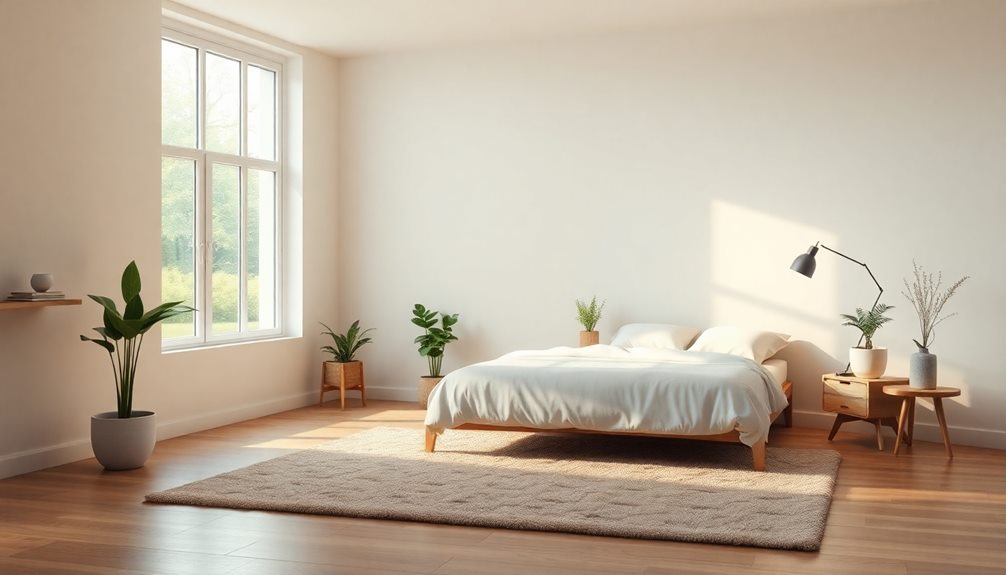
By creating a sleep-conducive environment, you've taken the first step towards a restful night's sleep.
Now, it's time to weigh the aesthetics of your bedroom. A minimalist bedroom design can greatly contribute to a peaceful atmosphere, helping you unwind and prepare for a good night's sleep.
A clutter-free space can calm your mind and promote relaxation.
To achieve this, ponder the following minimalist bedroom design tips:
- Simplify your color palette: Stick to calming colors like white, gray, or beige to create a soothing ambiance.
- Limit patterns and textures: Avoid busy patterns and textures that can stimulate your brain and make it harder to fall asleep.
- Edit your furniture: Keep only the essential pieces of furniture, such as a bed, dresser, and nightstand, to create a clean and clutter-free space.
Frequently Asked Questions
Can Natural Sleep Aids Help With Sleep Disorders Like Insomnia?
If you're struggling with sleep disorders like insomnia, you're probably looking for ways to get a good night's rest.
You might be wondering if natural sleep aids can help. They can. Certain natural sleep aids like melatonin, valerian root, and magnesium have been shown to promote relaxation and improve sleep quality.
How Long Does It Take to Notice the Effects of Sleep Aids?
When you try something new to improve your sleep, you're probably wondering how long it'll take to notice a difference.
The answer varies from person to person, but generally, you can start to feel the effects within a few days to a week.
If you're consistent with your new sleep routine, you might notice improvements in your sleep quality and duration within 7-14 days.
Are Natural Sleep Aids Safe for People With Allergies?
When you're considering new products, especially for something as vital as sleep, you'll want to know if they're safe for people with allergies.
Most natural sleep aids, such as essential oils and herbal supplements, are generally hypoallergenic. However, you should still read labels carefully and look for certifications like allergen-free or fragrance-free.
If you're highly allergic, it's always a good idea to consult with a doctor or healthcare professional before trying something new.
Can Children Use Natural Sleep Aids for Better Sleep?
When deciding if kids can use natural sleep aids, you consider their age and sensitivity.
For toddlers and infants, it's best to avoid any supplements or aids, as their developing bodies might react unpredictably. However, for older children, you might try gentle, non-ingestible options like a calming essential oil diffuser or a cozy sleep mask. Always consult a pediatrician before introducing any new sleep aids to guarantee your child's safety.
Do Natural Sleep Aids Interact With Prescription Medications?
When you take prescription medications, it's vital to weigh potential interactions with other substances.
You should know that some natural supplements can interact with your medications, affecting their efficacy or increasing the risk of side effects.
You may need to avoid certain supplements or adjust your dosage if you're taking medications like blood thinners, diabetes meds, or blood pressure meds.
Always consult your doctor before combining natural aids with prescription medications.
Conclusion
You've carefully crafted your bedroom into a serene oasis, and now it's time to reap the rewards. Your sleep sanctuary is a masterpiece, with every element working together in harmony like the strings of a symphony. As you drift off to sleep, remember that a restful night's sleep is the conductor, orchestrating a beautiful performance of physical and mental rejuvenation.

